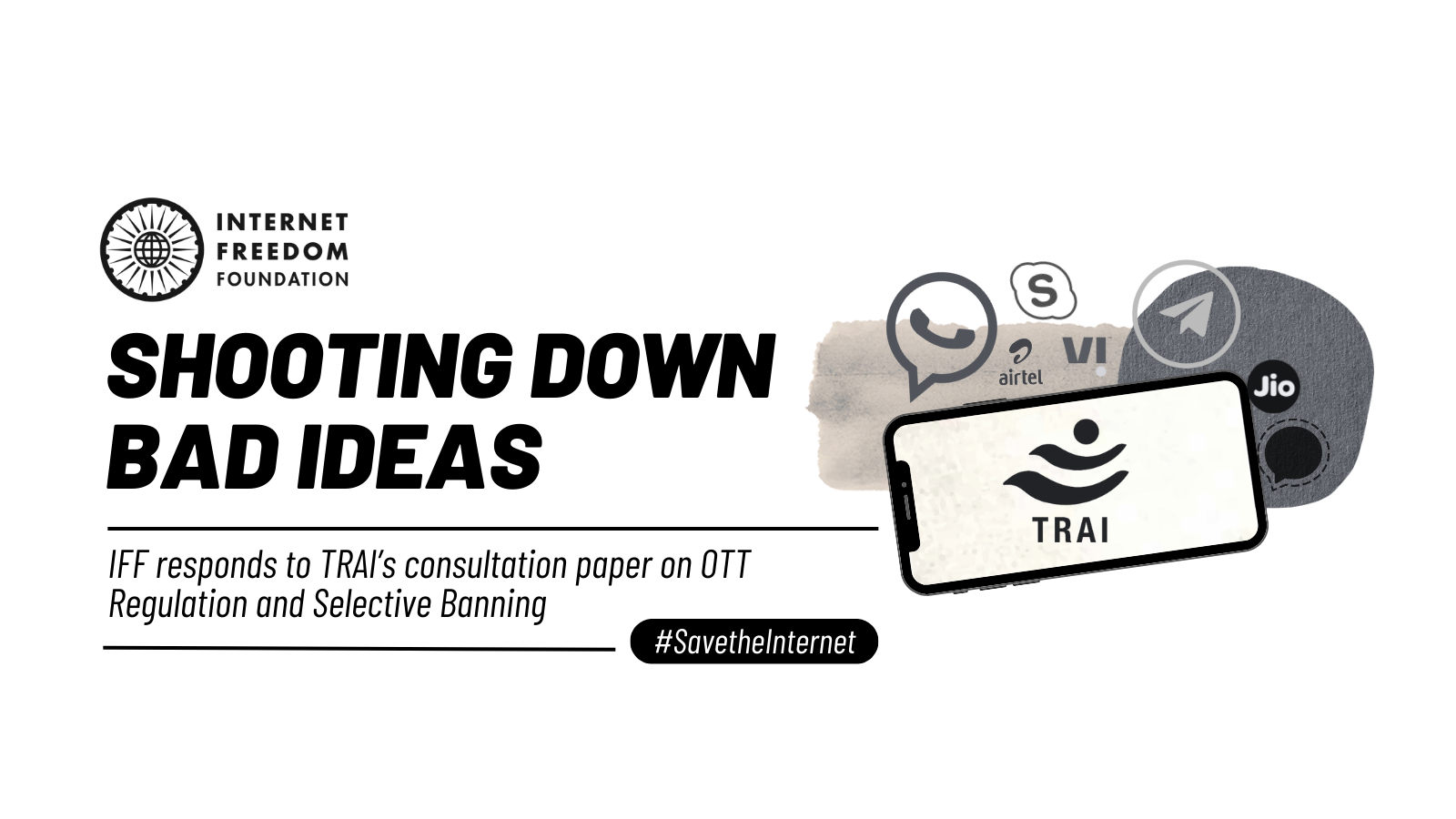
tl;dr
The Telecom Regulatory Authority of India (TRAI) released the consultation paper on ‘Regulatory Mechanism for Over-The-Top (OTT) Communication Services, and Selective Banning of OTT Services’ on July 07, 2023. After two extensions, the final deadline for submitting comments and counter comments were decided as September 01, 2023 and September 15, 2023 respectively. In our response, dated August 29, 2023, we highlighted our several concerns with the suggestions proposed in the consultation paper. We expressed our view against the licensing and registration of OTT communication services. We also communicated our belief that in addition to a lack of adequate evidence indicating a need for regulatory intervention, lack of a clear statutory basis or reasoning exists for TRAI to take this matter up for consultation. We also expressed apprehension on the suggestion to selectively ban OTT services, given its ad-hoc, non-transparent, ambiguous, infeasible, and impractical application, and the negative consequences it may have of user choice and freedom.
Detailed submission:
Below, we summarise our detailed comments on the various themes/ aspects raised in the consultation paper:
- Reductionist definition and classification of over-the-top (OTT) services: One of the criteria used by TRAI to define OTT services in this consultation paper is that they are direct technical/ functional substitutes for traditional telecommunication services. This, according to us, is a very reductive and improper criteria as the substitutability of any service cannot be clearly made out and is closely linked to a large list of criteria. We listed several justifications to prove that the arguments for substitutability of services between TSPs and OTT communication services are unfounded. The current definition of OTT services adopted by TRAI, and as an extension, any classification of such services, will be unable to reflect the complexity arisen by the multiple functions performed by a service. Thus, we hold a preliminary view against the functional definitional treatment of internet applications and services as OTTs as well as their categorisation as per the services offered by them which further builds into a case for licensing and registration to protect telecom service providers (“TSPs”).
- Historical baggage with regard to regulating OTT services: In the previous Net Neutrality and OTT Regulation paper published on March 27, 2015, TRAI’s argument outlining the regulatory and economic imbalance between TSP and OTT services was not precise, and ended up making paternal statements for regulation, citing arguments such as addiction to online games and social media. This approach seems to be driven by an instinct to regulate the internet per se from the lens of TSPs rather than satisfy any regulatory need.
- Misguided interests: TRAI relies on two premises to make the causal link requiring regulatory intervention: the existence of service substitutes resulting in OTT services stealing revenues and profits of the TSPs, and the existence of a market failure, in which there is a lack of adequate financial incentive for large TSPs to invest in infrastructure due to the lack of compensation. It is our initial belief that implementing regulations that impose financial burdens or levies on OTT services is not a wise public policy approach. Rather than protecting company profits of both TSPs and OTT service providers, the goal of regulation should be to serve the public's best interests.
- Regulatory overlap: The concentration of market power by large online platforms and the lack of compatibility or ease of migration from one online service or app to another are valid concerns raised by the consultation paper. While these are a credible public policy concern and may require regulatory intervention, we are unsure whether TRAI, as a telecom regulator, should be the one to take this up. A more fundamental question that arises is whether licensing is an appropriate approach to tackle competition concerns. It is also worth considering the entry barriers and other constraints OTT licensing may create for non-dominant service providers.
- Risks to privacy, safety, and security due to licensing: The consultation paper seeks comments on the licensing/ regulatory framework(s) around lawful interception of OTT communication services. Notably, India’s recently enacted data protection law does not put into place any meaningful safeguards against overbroad surveillance. Hence, any conversation which progresses to argue for expanding the applicability of lawful interception, that too in the absence of relevant safeguards, is completely against user interest and will be another step in building a surveillance state. Furthermore, any attempt to disclose/ verify the customer or communicator identity will strip away an individual’s right to anonymity and have deleterious impact on vulnerable individuals such as whistleblowers, who wish to keep their identity anonymous.
- Selective banning- all of the existing concerns with internet shutdowns, and some more: Highlighting the high economic and social cost of complete internet shutdowns, TRAI sought comments on an alternative approach, i.e. to selective banning of specific OTT applications and websites etc. in specific regions, “which are likely to be used by the terrorists or anti-national elements”. We highlighted the technical infeasibility and impracticality, as well as ad-hoc and non-transparent application of such an approach, by outlining how a similar approach of ‘whitelisting’/’allowlisting’ some services played out in Jammu and Kashmir in 2020. We raised pertinent questions around the methods through which a selective ban will be implemented and the unintended consequences it may have on the conduct of business, especially by small-scale businesses with a predominant social media presence. We brought to TRAI’s attention that while malicious actors may find workarounds, citizens that rely on a daily basis on services using the internet at scale may not, and thus will be impacted. Alternatively, those seeking workarounds without any malintent may be also be criminalised. Lastly, we made a reference to the order allowing partial lifting of the internet ban by the government of Manipur subject to several “impractical” conditions. We displayed how the Manipur order is a testament to the fact that a restricted shutdown is impractical and may lead to increased burden, cost, and worrying consequences for subscribers.
Conclusion
It bears repetition that the core thesis of a market failure and the need to correct regulatory imbalances is yet to be established. We even dispute the arguments for substitutability of services between TSPs and internet applications and services. Thus, we reiterate our stance that there is inadequate evidence at the moment, and therefore no need, for creating a collaborative framework between OTT communication service providers and the licensed telecommunication service providers.
We understand TRAI’s temptation to consider selective banning over complete internet shutdowns. However the technicalities of implementing such selective bans as well as their effectiveness, must be examined before putting forth this proposal. We advise against using such means in the name of perceived benefits, especially when evidence exists to portray the real harms.


